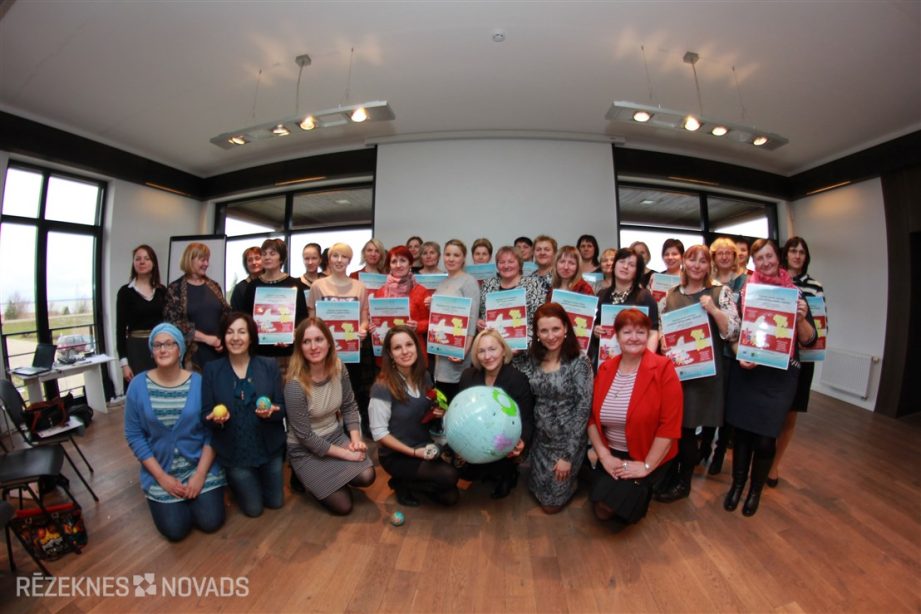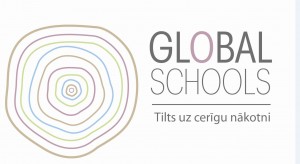Global education – the world in ours and us in the world

The Rēzekne municipality manages a Ozolaines pre-school education institution (PII) to attend various children. A dark baby with a black curly haircut, one of the children moving in a wheelchair, appears between the pale heads and the latvic braids. MR Valentin Malisheva, head OF PII, acknowledges that it is not a nuisance for children to play and play among themselves. “Children are more modern, more open, they perceive the world as they are.” For adults who are sometimes more painful in these differences, we say that, for example, one has glasses, the other is not, is the one who has glasses worse than the one who does not have? Not worse! One has a wheelchair, the other has no white face, another black. “The kids take it very well, we haven't had any problems.”
Ozolaines PII is one of 24 educational institutions of Rezekne, which is involved in the international project “Global Schools”, which will be implemented from 2015 to 2018. For three years, teachers will have the opportunity to learn the themes of global education (GI), expand their vision, and also apply practical knowledge, explaining children how to understand the modern world and themselves in the world, as they change, make it better. On 16 December, a round table was held in the framework of the “lighthouse” project, which included representatives of the schools involved in the project, experts of the project “global school”, as well as representatives of the municipality of Gulbenes, who have already participated in a similar project. The participants of the discussion sought to understand why it is important to talk about the topics of global education in the modern changing world, which is the place of Latvia in this process, what topics are topical in the Rēzekne municipality.
Clover and globe
At the end of the round table discussion, each of the participants in the project, he had to present his educational institution, telling two things, which we are proud of, and what we expect from the involvement in the Global Schools project. If there was much to say to the first question, then the second school representatives were more concise and insecure. Oļesja Apina, THE leader of THE Čornajas PII “miracle”, had brought the march with him. “Each of the petals you're proud of is our children, parents, projects, collective, new ideas, and that's what it's all about.” What are we waiting for from the project? Perhaps the knowledge from other countries' partners to learn what they are thinking about this global education, and to share our knowledge. “Maltas High Schools and PII“ Dizpariņš ”representatives from engaging in the project would like new methodological materials, new members, new knowledge of global affairs in the world, and not losing their identity in a multinational environment.“ We want to understand how better to live in a better world, ”– said League Salmane, the position of Lucia Ranāne McKashan as a secondary school teacher.
The project's leading expert, PHD Inga Belousa, explained the essence of the global education by holding an apple from her grandmother's garden in Latgale, the other being an equally large plot of earth, because only the awareness of her local identity gives strength and a swing to know and not be lost in the global world. “I thought it was very wonderful that the clover i showed you was very good and well-motivated, strong.” And if we have one leg very strong, then we have a motivation to take that second step. Because if we had the apple and unsafe, then that means that we would be equally small and unsafe in the second, global, step, if we dared to take it. But it shows me that we can safely, through cultural identities, through local identities, find bridges to the global world. Another thing we have: we are hospitable, open to people from outside that are very important in this global education. Maybe we should also learn to take, not only if we learn to stop, stop, listen, think, set bridges, then the other leg with a global step would be as strong. '
How to tell the world?
The project expert, the pre-school and primary school specialists of the National Education Content Centre of the State Education Content Centre, Agrita butcher Rēzekne municipality, called the educational institutions a stumble, as a global education line will also be incorporated into the new standard of competencies that will enter into force in 2016. The members of the discussion shared their knowledge of ways to explain the modern changing world to children? Čornajas PII manager Oļesja Apina believes that it is possible only through play. “It is also done by our creative teachers. We have already held discussions that are very much liked by small children, such as what they look like and what children are thinking elsewhere. We have already done all this, so it may be easier for us to be involved in the global education project."
The expert, the leader of the company “humanana People to People in Latvia”, gave her hand dolls that tell children, for example, the story of African children. “I believe that we must start with children in order to build a sustainable society.”
The leading expert, Inga Belousa, stressed that the methodology for global education has so far been developed only for primary and secondary schools, and it will now be necessary to develop it for pre-schools. “What is the most important thing in communicating with pre-school children and teachers -- do not distinguish anything from yourself, do not make two camps, watch what i do on a day-to-day basis, in our local community and how it affects others. If i discard the paper, how does it affect others? If i drop the dirt in the river, how does it affect the sea, and how does the pollution affect the whole world? In pre-school children have a very strong imagination, i sometimes think we must learn from them, how to jump through contexts. We must be more open to children's stories, as we can learn from their stories. '
At the time of the debate, the participants had the opportunity to explore the world model in a playful way in order to be able to understand how migration, inequality, poverty. The expert Ruth Kronberg called on the continents to split up and split chairs like imagined world money. The real situation proved that the most free space and resources are located in Europe, the least in Asia, which also causes inequality. “What does it say about Latvia?” The fact that we have a lot of privileges, opportunities, social guarantees that we should appreciate in the context of the world. '
Global education – education on values
Representatives of the municipality of Gulbenes shared their experience in the FIELD. The Gulbenes municipality took part in the global education project two years ago, the project will conclude next year, in March 2016, and many valuable lessons have been gained in the meantime. Since the financing of the project was 300 000 euros, which is three times higher than the municipality of Rezekne, it gave the opportunity to involve the entire municipality and implement many of the activities of the society, including the summer camps, the eco-cycling competition, the natural concert hall, the think tank teachers, the discussions. “Main message: The topic of this topic never ends. Global education – it is an education of values that are never enough time in school programs. I envy you that you're going to do it all now, and start with children of pre-school age,” said Anita Birzniece, the head of the head of the Gulbenes council, the head of the education, cultural and sports department.
Change yourself to change the world
At the end of the discussion, at the time of the catch-the-eye, the participants sat down in a tight circle and, giving each other a little model of the earth, sought to formulate their feelings and the lessons of the start of the project:
- It is nothing new but must be deepened, expanded.
- Dare and change.
- Learn, read, explore, feel through the heart.
- You know yourself and then know the world.
- We will try to change with the world.
- The feeling of the shoulder and the friendship we felt today.
- Kneeling with his mind, he walks with his heart and walks with his feet.
- I need to learn and go with time.
- We must learn to live green, clean, beautiful.
- The parents of children, families, should be more involved and educated.
“The bureau, called global education, has a sail today to be a successful swim,” – it was drafted by the project expert, the head of the pre-school educational administration of the municipality of Rezekne, Biruta Reivāne. On the other hand, the project coordinator Inta Ozolniece invited the present to select one of the three main slogans that occurred in the course of the day: “1. The world has changed – we will talk about these changes to children! 2. The world around us, we in the world! 3. We can't change the world, we can change ourselves! The most raised hand was the last slogan, which shows the willingness of the project participants to know and change to make the world better.
Anna Rancāne
Eduarda Medvedev photo
This project is financed by the support of the European Commission. This publication reflects only the opinions of the author and the Commission cannot be liable for any possible use of the information contained therein.


